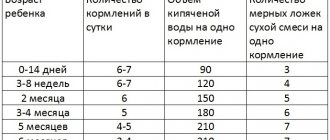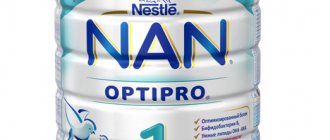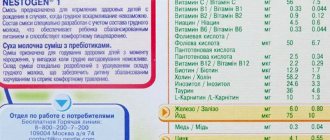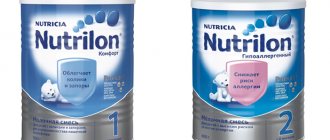Breastfeeding is preferable for feeding young children. Products of the MALYUTKA® brand are food for children from birth to three years. Before using the mixture or introducing complementary foods, you should consult a specialist.
Mother's milk is the best nutrition for the baby, but often due to the health of the mother, breastfeeding becomes impossible. Then infant formula comes to her aid. And here it is important to choose a product that suits the child in all respects.
Read also: Tips, rules and recommendations for choosing infant formula
One of the popular and sought-after formulas is the infant milk formula “Malyutka” from Nutricia LLC. For the little ones, the company provides two types of products: infant formula and baby milk. The development and updating of the product composition is carried out in accordance with the latest research from the medical community. Due to the presence of GOS/FOS prebiotics, the formulas are as close in composition as possible to breast milk.
Baby formula and milk “Malyutka” are a guarantee of quality, European ingredients, no preservatives, no added sugar, no dyes, no artificial additives, no GMOs.
Preparation
Choosing the right formula (no one can guarantee that this particular formula will suit a particular child) is only the beginning of the whole journey. The mixture must be prepared correctly so that every milligram of nutrients is beneficial.
Preparatory stage
Prepare and dry clean bottles, which pediatricians usually recommend boiling or steaming, especially in the first 2-3 months. Pediatrician Komarovsky believes that this is an unnecessary measure and a simple scalding with boiling water is enough. Prepare nipples for the bottle and a clean measuring spoon from the packaging in advance: you cannot use measuring spoons from other formulas for “Malyutka”. Their capacity may vary.
Proportions calculation table
| How old is your baby? | How much to feed per day? | How much water do you need? | How many scoops of Malyutka-1 food? |
| 0-14 days | 6-7 | 90 | 3 |
| 3-8 weeks | 6-7 | 120 | 4 |
| 2 months | 6 | 150 | 5 |
| 3-4 months | 5 | 180 | 6 |
| 5 months | 4-5 | 210 | 7 |
| 6 months | 3-4 (introduce complementary foods) | 210 | 7 |
How to properly dilute baby milk?
Do not use leftover mixture by mixing it with a new portion. This is a simple, but most broken rule of all.
How to properly feed your baby:
- Heat clean, boiled water (if the baby is a newborn, it is better to use special baby water that does not require boiling). The required temperature is 40 degrees.
- Measure the required amount according to the scale on the bottle: 1 spoon requires 30 ml of water. For example, we pour 210 ml for a 5-month-old child.
- Add the mixture using a standard packet spoon. You need a full spoon, but without a pile on top, which we remove with a knife.
- Screw the cap onto the nipple tightly and shake the bottle, holding the hole with your finger. You need to shake until the food is completely dissolved.
How to properly prepare baby formula “Malyutka 1”
There is nothing difficult about learning how to dilute formula. A little patience, practice and you will learn how to make food quickly and tasty
It is important to follow the following rules:
1. Utensils for milk must be not just clean, but sterile. Immediately before diluting the product, pour boiling water over the containers. As for the mixture itself, the pack of “Malyutka” should be carefully closed after each use.
2. Prepare the water - boil and cool to 40 °C. Take the powder at the rate of: 1 measuring spoon (available in each pack) per 30 ml of water.
3. Have you prepared everything? Now proceed directly to the preparation: pour water into a sterilized bottle (control the amount of water using the scale on the bottle) - if you first put the powder in the container, you will not be able to measure the exact amount of water later. Then pour in the pre-calculated amount of product.
4. Close the bottle and shake it, stir so that there are no lumps left in the container.
5. Now make sure that the mixture is not too hot and the baby will not get burned. Drop a little diluted milk on your wrist; if its temperature is too high, you will feel it.
ATTENTION: Do not heat diluted milk in the microwave as lumps may form in it. It is also forbidden to add dry powder to already prepared milk - this will upset the proportions and can lead to negative reactions in the baby
Also, you cannot store ready-made milk “Malyutka” for more than twenty minutes.
Another important point. Many mothers who feed their children with artificial formulas are interested in how many times a day should they give their child diluted milk? If with breastfeeding many pediatricians recommend giving breasts on demand, then in the case of store-bought formulas, you should adhere to certain standards:
- up to two weeks, the child should be given 6-7 servings, consisting of three measuring spoons of powder and 90 ml of water;
- at the age of three weeks to two months, the amount of milk increases: the child receives the same 6-7 meals, but four measuring spoons each (with 120 ml of water);
- at two to three months, the baby will be full if he is fed six times a day, offering a bottle containing five scoops of “Baby 1”;
- from three to four months, the number of feedings is reduced to 5 times a day, while six scoops of product are placed in the bottle;
- Five-month-old babies eat 4-5 times a day. Place seven spoons of powder in a bottle and dilute with 210 ml of water;
- From six months, complementary foods can be gradually introduced. Due to this, the number of feedings can be reduced to 3-4 times a day.
How do you know if “Malyutka” is suitable for your child?
Everything is individual, and even popular Russian adapted artificial milk may not suit your baby. To make sure that the formula you are feeding your baby is suitable for him, answer the following questions for yourself and your pediatrician:
- Does your child often have tummy problems? Severe gas formation, colic, diarrhea, constipation? If the answer is “yes,” consider whether you should try a mixture with Malyutka Premium prebiotics or, if you are already on it, switch to another company.
- Is the child's weight gain within the normal range? Has your baby stopped gaining weight or, on the contrary, is he gaining too much? Consider trying a different blend.
- Does your baby have allergies? For example, diathesis. If the answer is “yes”, analyze whether the child may be allergic to cow protein or one of the ingredients of the Baby formula.
Baby food "Malyutka" is a budget-friendly, high-quality version of adapted artificial milk for babies. It can easily be found in supermarkets and pharmacy chains; it has a pleasant, almost neutral taste and smell, unlike some expensive European mixtures. Provided that your child is not allergic to the ingredients, and this mixture suits his body, the described products will become your assistant in creating your child’s diet for many months.
Malyutka milk and fermented milk mixtures contain lactose, so they cannot be used to feed children whose bodies cannot cope with the absorption of cow's milk proteins. However, according to pediatricians, intolerance is a completely normal and common occurrence. It is often associated with digestive disorders that are not caused by the composition of the mixture, and goes away after proper treatment. In this case, it is quite possible to return to the use of “Malyutka”, while eliminating the genetic nature of lactose intolerance.
Also, an allergy to the “Malyutka” mixture may occur due to the gluten content in it. The manufacturer warns that traces of gluten may be contained in mixtures of steps 3 and 4, but are not included as a complete component.
Reviews from pediatricians
The “Malyutka” mixture has passed all clinical studies and is approved by leading pediatricians and nutritionists. This means that it has been tested to meet safety and quality parameters. This fact inspires confidence, and parents buy Malyutka formula with confidence.
Feedback from pediatricians is only positive. Thus, most pediatricians recommend this brand of nutrition from the birth of the baby if the mother has problems with lactation.
There are cases when young parents first buy expensive imported formula. But they often cause allergies and stool problems. After examining and determining the cause of this, as a rule, pediatricians advise switching to the “Malyutka” formula.
Feedback from pediatricians often concerns the composition of the mixture. Thus, compared to more expensive analogues, “Malyutka” food does not contain palm oil.
It is also necessary to take into account the fact that many pediatricians have witnessed how more than one generation has grown up on the “Malyutka” mixture. This also builds trust in these products.
Which formula should I choose for my baby?
On the shelves of pharmacies and stores there are a huge number of described goods of domestic and foreign production, among which it is easy to get lost. It is a mistake to focus on cost as an indicator of quality. The rating of infant formula shows that cheap products are often better than expensive ones
It is important for parents to study the composition of the diet and the extent to which it corresponds to the age and needs of the baby.
Which formula is best for a newborn?
The described early nutrition group is marked with the number “1” on the packaging by all manufacturers. Infant formulas from 0 to 6 months should be maximally adapted for infants, close in chemical content to natural breast milk (unless there are other medical recommendations). It is advisable that the product does not contain rapeseed and sunflower oil.
Rating of formulas for newborns, based on the opinions of pediatricians:
- Nutrilon from Nutricia.
Produced in Holland, enriched with nucleotides, polyunsaturated fatty acids, prebiotics, vitamins and minerals. This is the best formula for newborns, but expensive. - Baby (manufacturers – Russia and Ukraine).
A very popular product due to its excellent quality and low price. The formula is maximally adapted for infants aged 0-6 months, is easily digestible and is similar in composition to breast milk. - Similac from Abbott.
Produced in Denmark, contains prebiotics, iodine, taurine and lactose. The product has a beneficial effect on digestion, prevents colic and reduces gas formation. - NAN from Nestle.
Swiss mixture, but subsidiaries can be located in any country. This diet contains a complex of valuable vitamins and microelements, therefore it strengthens the baby’s immunity and helps the functioning of the gastrointestinal tract. - Nestogen, also manufactured by Nestle.
The mixture contains prebiotics, which ensure comfortable digestion and the absence of problems such as flatulence, excessive regurgitation, constipation or diarrhea.
Rating of products that include specialized treatment series (hypoallergenic, for intestinal problems, lactose intolerance, and others):
- Nutrilak;
- Nanny;
- Kabrita;
- Alphare.
Formula for children from 6 months
After six months, babies digest cow's milk more easily; their diet may contain partially hydrolyzed proteins. Such infant formulas are marked with the number “2” on the packaging. They are less saturated with vitamins and minerals, pre- and probiotics, because the introduction of complementary foods begins at 6 months. A rating that allows you to determine which infant formula is better at a given age:
- Nutrilon;
- Materna;
- Nuppi;
- Similac;
- Baby;
- Nestogen;
- NAN;
- Semper;
- Agusha;
- Enfamil.
Which formula should I choose for a child after one year?
A child over 12 months digests milk protein well, but is not yet ready for a natural product, either cow or goat. Infant dry formulas, concentrates or ready-made liquids for one-year-old babies are marked with the number “3” on the label. They are included in the group of partially or unadapted nutrition, which may include processed milk powder. List of mixtures recommended by pediatricians:
- Nutrilak;
- Baby;
- Peptamen;
- NAN;
- Kabrita.
Which formula should I choose for premature babies?
A prematurely born baby needs food with increased energy value and an increased concentration of vitamins, micro- and macroelements. A pediatrician should advise which formula to choose for a newborn premature baby. This type of product is marked with the number “0” or the letters “pre”, “pre” in the name. The best formula for newborns born prematurely can be selected from the following list:
- NAN;
- Aptamil;
- Nutrilon;
- Similac;
- Nutrilak.
Features of dairy products "Malyutka"
The entire KHMKKKDP food series is made from domestic raw materials. To produce products, the company uses only natural milk, enriched with important micro- and macroelements, beneficial vitamins and other biological components.
Thanks to unique technology, the manufacturer uses only fresh, not powdered milk. And this allows you to increase its biological value and preserve important taste qualities.
All “Malyutka” mixtures and cereals are produced strictly according to technology. In addition, the products do not contain preservatives, radionuclides, flavors or other harmful substances. Therefore, mothers who were unable to establish lactation after childbirth can safely buy the “Baby 1” formula. The manufacturer took care of the quality and safety of baby food. All mixtures were developed by leading nutritionists and specialists in the field of dairy production.
Baby
Baby formula has established itself as a food that contains many useful substances, vitamins and minerals, such as magnesium, potassium, iodine, folic acid, vitamins A, E, C and D, as well as others. Together they have a positive effect on the development of the newborn.
Features include:
- Rapid dissolution of the mixture.
- Contains 16 vitamins and 11 minerals.
- The mixture dissolves without forming lumps.
- Contains only natural ingredients.
Kinds
“Baby” No. 1 can be used as the main food and supplementary food for a newborn, since it is considered a good substitute for breast milk if the mother produces it in insufficient quantities or is absent.
The unit can be used from the very first days of the baby’s life until 6 months. The product is enriched with prebiotics that strengthen the immune system and has a rich and balanced vitamin and mineral composition.
The features of the product also include the presence of components such as soy lecithin and choline, which allows the child’s brain to function normally. The composition also contains the following oils:
- Sunflower.
- Palm.
- Rapeseed.
In order to prevent the development of deficiency conditions, the “Baby” milk formula contains fish oil, which is a source of vitamin D.
“Baby” No. 2 from Nutricia can be included in the diet from the age of 6 months to one year. The composition of this product meets all requirements, as it includes a set of all minerals, vitamins, amino acids and trace elements necessary for the normal growth and development of a child.
“Baby” No. 3 is suitable for children older than one year, since at this age they also need breast milk or its substitute for full development.
Some newborns are underweight, and pediatricians prescribe the introduction of their first complementary foods in the form of formula milk with the addition of cereals. They are available for use from 4 months. Baby No. 4 comes with oatmeal, rice, corn and buckwheat flour.
Malyutka reviews
Taking into account the differences in the needs of children of different ages for nutrients, biologically active substances and energy, four formulas for baby food were developed:
1) adapted dry infant formula Malyutka 1 from birth;
2) adapted dry infant formula Malyutka 2 from 6 months;
3) baby milk Malyutka 3 from 12 months;
4) baby milk Malyutka 4 from 18 months.
All baby food of the Malyutka brand fully comply with the requirements of Russian legislation for products for feeding young children.
It contains only high-quality and proven ingredients, and the quantitative composition complies with the requirements of TR CU 033/2013 “On the safety of milk and dairy products.”
Protein component:
The sources of protein in Malyutka mixtures are:
— demineralized whey;
- skimmed milk;
- whey protein concentrate.
Despite the same origin - cow's milk, Malyutka 1 and 2 are very different in composition from Malyutka 3 and 4.
Demineralized whey mainly contains lactose and whey proteins (albumin).
Skim milk is characterized by a predominance of casein over whey proteins and an almost complete absence of milk fat.
Whey protein concentrate is whey proteins purified from other milk components.
As a result of this combination, the basis of human milk substitutes Malyutka 1 and 2 is obtained with a ratio of whey proteins and casein of 60/40 - the same as in mature breast milk.
In Malyutka 3 and 4, the manufacturer uses only skim milk, so the ratio of whey protein to casein is 20/80, the same as in cow's milk.
The need to change cow's milk is explained by the fact that at an early age the digestive system is still very sensitive and adapted only to breast milk, so the mixture should be as close as possible to it.
After 1 year of life, the child’s food becomes more and more similar to that of an adult; the digestive system is already “familiar” with many foods and can react quite calmly to cow’s milk protein.
For the full growth and development of a child, the amino acid composition is also important.
Some amino acids can be synthesized in the body, others come only from food, and therefore are called essential.
Taurine and L tryptophan are added to the Malyutka 1,2 formula, and L-isoleucine and L-cysteine are also added to the Malyutka 3,4 baby milk.
Fat component:
Vegetable fat is the main type of fat, infant formula and Malyutka baby milk.
Other types of fats are the remains of cow's milk fat, fish oil, and oil of the single-celled fungi Mortierella alpina. The last two types of fat are added only to the Malyutka 1 and 2 mixtures.
Palm, rapeseed, coconut and sunflower oils are added to all Malyutka mixtures. Coconut oil contains the most low molecular weight fatty acids - capric and lauric. Rapeseed oil is rich in linolenic acid, vegetable oil - linoleic acid, palm oil - palmitic acid, Mortierella alpina - arachidonic acid - omega-6, fish oil - docosahexaenoic acid - omega-3.
The significant difference in the content of these acids in cow's and women's milk does not allow the use of cow's milk fat in breast milk substitutes.
The content of palmitic acid in cow's milk fat and human milk fat differs slightly, but since milk fat is removed almost completely, the lack of palmitic acid can only be compensated for by using vegetable oil with a high content. Palm oil is most suitable for this.
It was only relatively recently that it became clear that simply striving to maintain an amount and ratio of fatty acids similar to that observed in human milk fat is not sufficient.
As it turns out, the position of these acids in fat molecules is also important. Moreover, due to the difference in structure, a negative effect of palmitic acid on the absorption of calcium and the child’s stool is observed.
Carbohydrate component:
Malyutka infant formula contains digestible and indigestible carbohydrates.
Digestible carbohydrates include lactose and maltodextrin. Lactose is a natural component of milk that gives it a sweet taste (milk sugar). Lactose is contained in the whey of cow's milk, so the packaging with the mixture contains demineralized whey.
There is much more lactose in human milk than in cow's milk. To achieve the required amount of lactose in the finished mixture, it is not enough to use only cow's milk whey; you need to add pure lactose.
Maltodextrin is not part of human milk and is often added to the formula to partially replace lactose (no more than 35% of the total carbohydrates).
Maltodextrin contains a significant amount of free glucose, which is easily and quickly absorbed directly, bypassing the action of the digestive enzyme lactase, which is necessary for the breakdown of lactose.
The presence of maltodextrin is especially important in the case of secondary lactase deficiency in a child, when there is a lack of lactase.
Malyutka mixtures contain indigestible carbohydrates - galactooligosaccharides (GOS) and fructooligosaccharides (FOS).
They have no nutritional value for a baby, but are actively used by the beneficial microflora of the large intestine - lactobacilli and bifidobacteria, stimulating its active development.
Substances exhibiting similar properties are called prebiotics.
Other components:
Important components of Malyutka baby food are nucleotides, which are part of RNA and DNA and are involved in energy processes inside the cell.
They can be produced by the body independently, but in small quantities, so during periods of active growth or in case of illness, the need for them increases.
An undoubted advantage is the presence in Malyutka of not one, but five nucleotides, which are indicated in the composition of the mixture.
In addition to vitamins and minerals, Malyutka mixtures are enriched with vitamin-like substances - choline, inositol, L-carnitine.
These substances can be synthesized by the body, but in early childhood the need for them many times exceeds the capabilities of biological synthesis, and therefore they must be supplied from the outside.
With their deficiency, symptoms may appear such as: - growth retardation and dysfunction of the central nervous system - lack of inositol;
- obesity and fat accumulation in the liver - lack of choline;
- increased fatigue and slower growth, hyperglycemia (increased blood glucose levels compared to normal) - lack of L-carnitine.
Soy lecithin is the only permitted food additive in Malyutka mixtures. Due to its emulsifying ability, soy lecithin increases the solubility of milk formula in water. This feature is associated with its main components - phospholipids, which are part of the cell membrane and perform a number of other useful functions.
Lecithin is a component of all natural fats.
Accordingly, soy lecithin is obtained from unrefined soybean oil. During oil refining, a significant portion of phospholipids is lost. Vegetable oils are refined before being added to infant formula, therefore, there is a need to artificially replenish phospholipids in the form of soy lecithin.
In general, Malyutka formulas can be characterized as a budget option for baby food, while at the same time providing the baby with everything necessary for normal growth and development.
When developing the recipe composition of the mixture, the manufacturer tried to include the main components that are found in breast milk in compliance with their required quantity for the baby.
When prescribing baby formula for children, I always make them aware of such controversial issues as:
-maltodextrin is not a natural component of breast milk, but there is nothing wrong with supplementing it.
- palm oil can affect the formation of a newborn’s stool and its frequency, therefore, if the child is prone to constipation, other formulas without palm oil are preferable.
— the lack of probiotics in the mixture is better compensated for by the use of probiotic preparations. The effect of their use will be higher than that of adding probiotics to infant formula.
Doctor's assessment:
2017-09-06 10:43:33
Varieties of milk porridges
Milk porridge “Malyutka” is available in the following types:
- Wheat with fruit, from 12 months. Contains a partially adapted milk mixture, a mixture of vegetable oils: palm, coconut, rapeseed, sunflower), soy lecithin, complex food additive, sugar, minerals, maltodextrin, vitamins, rice flour, natural additive from pears, bananas, peaches. Maltodextrin is a carbohydrate component that has a prebiotic effect, is easily digested in the gastrointestinal tract, promotes better absorption of vitamins and microelements, and has a pleasant sweetish taste.
- Corn and rice with fruit, from 8 months. Porridge is a good source of energy and rice contributes to the proper functioning of the baby's intestines.
- Multigrain with cookies, from 6 months. Takayakasha "Baby" is
an ideal source of energy for a growing child. The whole grains included in the product contain more vitamins and fiber than regular cereals. The porridge also contains special children's cookies, which will not only give the baby pleasant moments, but also introduce a new taste. - 7 cereals with lemon balm, from 6 months. Contains wheat, hydrolyzed wheat, rye, millet, barley, oats, corn, rice, sugar, vitamins. Porridge provides the child's body with energy and helps the normal functioning of the intestines.
- “Rainbow of Flavors” - a set of cereals in bags, from 6 months. Contains 5 packages of milk porridges: “Wheat milk porridge with banana”, “Buckwheat milk porridge with apple and carrots”, “Multi-grain milk porridge with fruits”, “Wheat milk porridge with pumpkin”, “Oatmeal milk porridge with fruits”.
- Buckwheat, rice, apricot, from 4 months. Porridge with buckwheat and rice with the addition of apricot will diversify your baby’s diet and provide a balance of microelements and vitamins. Buckwheat will saturate the child with B vitamins, valuable amino acids and minerals, and rice and apricot will ensure comfortable digestion.
- Buckwheat, from 4 months. This “Malyutka” porridge is a perfectly balanced first complementary food. It is rich in essential microelements and does not contain gluten. And B vitamins, valuable amino acids and minerals are necessary for the child’s body for full development and growth.
- Buckwheat with prunes, from 4 months. Prunes stimulate the intestines and contain antioxidants that are involved in the proper functioning of the immune system.
- Corn, from 5 months. Porridge has an ideal balance of minerals and vitamins, which provides complete nutrition for the child. It is easily digestible, has high nutritional value and regulates the functioning of children's intestines.
- Multigrain, from 6 months. Porridge is an ideal source of carbohydrates that provide the baby with energy. The rice, buckwheat, and corn included in the formula are easily digestible and provide the child with valuable minerals and amino acids necessary for a growing body.
- Oatmeal, from 5 months. This porridge has a positive effect on the functioning of the heart. Cereals are rich in potassium, magnesium, B vitamins, help intestinal function and facilitate the digestion process.
- Wheat with banana, from 6 months. Wheat and banana will provide the baby with the necessary energy. Nutritious bananas will improve your mood, and your baby will get proteins, easily digestible carbohydrates and potassium from wheat.
- Multigrain with mixed fruit, from 6 months. This product will help develop your child’s sense of taste. Cereals will give you strength for new achievements, and fruits will give you real pleasure.
- Wheat with pumpkin, from 5 months. Wheat will provide energy to a rapidly growing body, and beta-carotene contained in pumpkin will contribute to the normal development of vision organs.
- Oatmeal with fruit, from 5 months. This “Malyutka” porridge contains a whole complex of important minerals and vitamins, without which the proper development of a child is impossible.
- Rice, from 4 months. Rice is 97% carbohydrates, which is pure energy, gluten-free, yet highly nutritious. Useful for mild digestive disorders.
- Multigrain with fruit, honey, and corn flakes, from 15 months. Porridge has a rich, rich taste and introduces the baby to new foods.
Reviews from parents
Parents' opinions about Malyutka formulas vary slightly. Most young mothers are satisfied with the quality of this food. According to reviews from parents, the “Malyutka” mixture dissolves well, has a pleasant taste and contains all the necessary microelements and vitamins. Also, most buyers chose Malyutka products due to their low cost.
It is very rare to find negative reviews. They mainly concern excessive foaminess. Some parents claim that the mixture does not dissolve completely, leaving small lumps.
In general, young parents highly appreciated the “Baby 1” mixture. Reviews from pediatricians and buyers indicate that this food is well absorbed and the child grows well. There are no disorders of the digestive system or allergic rashes in children.
The difference between fermented milk mixture and milk mixture
First of all, it should be noted that fermented milk mixture is a medicinal product that is intended for children with problems with the gastrointestinal tract. Their main advantage is their composition and functionality. Due to the lack of sugar, the baby is less likely to suffer from colic.
Keep in mind that the “Malyutka” fermented milk mixture is medicinal, so it can only be prescribed by a pediatrician and for a course of no more than one month. To prescribe such nutrition, the individual characteristics of the baby’s body, its condition and age will be taken into account.
The main differences between fermented milk mixture and regular milk:
- This is a medicinal mixture that is prescribed by pediatricians only when problems arise with the baby’s health, in particular, problems with the gastrointestinal tract.
- They contain probiotics to promote the growth of favorable intestinal flora and prevent the growth of pathogenic bacteria.
- Only strains of microorganisms isolated from humans that will not have a toxic effect can be used.
- The bacteria are resistant to the external environment and are active during storage and preparation of the product.
- Probiotics, after entering the body, release lactic acid, which improves the functioning of the gastrointestinal tract, eliminates colic attacks, and increases appetite.
Here is the main difference between fermented milk formula and regular milk: the presence of probiotics and lactobacilli, which have a positive effect on the child’s body.
Benefits of the mixture
- The Malyutka brand is a leader in the Russian and Ukrainian baby food markets.
- Malyutka nutrition is created using a unique recipe, thanks to which the mixture perfectly replaces breast milk in composition and calorie content.
- The mixture has undergone clinical testing.
- Natural composition, the manufacturer uses only proven ecological raw materials, the quality of which complies with international norms and standards.
- Balanced composition of vitamins and minerals.
- Low cost compared to analogues from other manufacturers.
- Convenient packaging; the manufacturer produces food only in cardboard boxes, which are easy to use and store.
The modern and bright design attracts buyers; there is a desire to purchase the “Malyutka 1” mixture. Photos of this brand's products are posted below.
Basic rules before choosing formula for a newborn
You should choose a formula for artificial feeding of a newborn after consulting a pediatrician. However, every caring mother should know a few rules that will help her choose the right baby food that will be ideal for her child.
- you need to buy formula only taking into account the child’s age;
- a healthy child should choose highly adapted formulas for the first six months of life;
- you should carefully study the composition of the mixture, the amount of ingredients, and calorie data;
- The mixture must contain taurine, which is involved in the formation of brain tissue and retina. This amino acid also improves the digestion and absorption of fats, improves immunity and is considered extremely necessary in the first months of a newborn’s life;
- the presence of carnitine is desirable - it is involved in the metabolism of fats, proteins, vitamins and energy inside the cell;
- the composition should contain linoleic acid - promotes the proper formation of the brain and internal organs;
- check the expiration date of the mixture;
- become familiar with the method of preparing the mixture; it should be clear and understandable for every mother;
- if the mixture suits the baby well, you need to be sure that there will be no problems with its purchase in the future; you can purchase several packages;
- As the child grows, the formula needs to be changed, so it is recommended to use the same manufacturer for the second half of life.
Mixture composition
“Baby” is universal and suitable for many children. Its composition, according to the manufacturer, includes exclusively natural ingredients that are absolutely safe for the health of children. The ingredients of this food do not contain any preservatives, dyes or other synthetic additives, GMOs, or sugar.
The composition of the “Malyutka” dry mixture is balanced and includes 16 vitamins and 11 minerals. This includes polyunsaturated fatty acids (omega-3 and -6), necessary for the full development of the child’s brain and nervous system.
Recently, prebiotics have been added to the mixture, which are necessary for the adequate functioning of the digestive tract and the prevention of bloating, constipation, and providing soft stools.
The basis of this diet is the proteins of skim milk and whey. The “Malyutka” formula contains a large amount of vegetable fats, which brings the nutritional value of the mixture closer to natural breast milk. Lactose, a natural sugar found in milk, acts as carbohydrates.
Like many other mixtures, “Malyutka” contains maltodextrin. For the ignorant, this term may seem unkind and unnatural. However, this additive is of plant origin, it is produced from starch and is a sweetener. Manufacturers add it to milk formula as a leavening agent. In addition, it improves solubility and increases the energy value of the product. Maltodextrin is safe for most children and adults.
How do you know if “Malyutka” is suitable for your child?
Everything is individual, and even popular Russian adapted artificial milk may not suit your baby. To make sure that the formula you are feeding your baby is suitable for him, answer the following questions for yourself and your pediatrician:
- Does your child often have tummy problems? Severe gas formation, colic, diarrhea, constipation? If the answer is “yes,” consider whether you should try a mixture with Malyutka Premium prebiotics or, if you are already on it, switch to another company.
- Is the child's weight gain within the normal range? Has your baby stopped gaining weight or, on the contrary, is he gaining too much? Consider trying a different blend.
- Does your baby have allergies? For example, diathesis. If the answer is “yes”, analyze whether the child may be allergic to cow protein or one of the ingredients of the Baby formula.
Baby food "Malyutka" is a budget-friendly, high-quality version of adapted artificial milk for babies. It can easily be found in supermarkets and pharmacy chains; it has a pleasant, almost neutral taste and smell, unlike some expensive European mixtures. Provided that your child is not allergic to the ingredients, and this mixture suits his body, the described products will become your assistant in creating your child’s diet for many months.
Breastfeeding is an important, responsible activity. The baby receives all the necessary vitamins and microelements from mother's milk.
What should mothers do who, for whatever reason, can breastfeed their baby?
On the shelves of stores and pharmacies you can find a lot of different dry formulas for feeding babies. Even pediatricians have a hard time understanding the wide range of products and recommending the best product for feeding a newborn. The following material is dedicated to the Baby 1 infant formula, the manufacturing company is a leader in the market of inexpensive, high-quality food products for children; it has existed since 1972.
About the manufacturer
Malyutka milk formula is produced by the Khorolsky milk canning plant for children's products, which is located in Ukraine. This company has been producing specialty and baby food for more than 40 years. Hundreds of thousands of kids grew up on KMKKDP products. Nowadays, baby food from this manufacturer is very popular.
Proven, high-quality and inexpensive - this is how the “Malyutka” milk formula is characterized. Reviews from pediatricians are also in favor of this brand. Many children's doctors recommend this milk formula.
An important advantage of the enterprise is its location. The food production plant is located in an ecologically clean area of the Poltava region. The company uses advanced equipment, the best refrigerators and power plants.
The company's employees pay special attention to product quality. Strict control is carried out at all stages of production. In addition, all products are periodically tested to ensure compliance with international standards. It is thanks to this responsible approach to the production of baby food that most mothers choose Malyutka formula. Reviews from pediatricians often concern the quality of these products. Pediatric doctors completely trust this brand.
Choosing a formula for mixed feeding
Which formula is best for newborns with mixed feeding is decided by the doctor and the parents of each individual child. Its composition necessarily includes iodine, taurine, nucleotides, polyunsaturated fatty acids, vitamins, minerals, pre- and probiotics. Among the ingredients in high-quality infant formulas there is no palm oil, significant amounts of sugar and starch. With the help of artificial nutrition, some problems with the baby’s health are solved:
- for constipation, infants are given fermented milk mixtures;
- for acute intestinal infections, substitutes with a low amount of lactose are chosen;
- For lactose intolerance, lactose-free mixtures are suitable;
- when regurgitating, anti-reflux mixtures with increased viscosity are used;
- when diagnosing an allergy, a hypoallergenic mixture labeled “HA” and “NA” is selected based on hydrolyzed proteins.
The top list of the best infant formulas will tell you which formula to choose for newborns with mixed feeding:
- Friso is a complementary feeding mixture for premature and low-weight infants. Enriched with iodine and amino acids, which have a beneficial effect on the development of the central nervous system and digestive system. The downside is that it contains palm oil.
- Nutrilak (Nutrilak). Thanks to the increased amount of nutrients, it strengthens the immune system and promotes proper digestion. The main advantage is that it does not contain palm and rapeseed oils.
- Similac (Similac) is a highly adapted mixture that relieves the symptoms of colic and constipation, does not contain palm oil.
- Nanny is created on the basis of goat's milk and is intended for children with intolerance to cow's milk. It is rarely an allergen in infants.
- Malyutka is a domestic mixture with a very affordable price. The composition includes prebiotics, iodine, fatty acids, palm oil, does not contain sugar.
Manufacturers offer a choice of baby food for newborns, and parents must consult with a pediatrician which is best before they start feeding the baby.
How to correctly move from one mixture to another?
Many mothers wonder how and when to correctly switch from artificial milk intended for a child of the same age to milk intended for an older baby? Adapted artificial milk, no less than complementary foods, requires gradualism and thoughtful actions. Here are a few important rules:
- Move on to something new gradually. We wrote earlier that Malyutka has different compositions for different ages. A new mixture is stressful for the baby’s body. Introduce new food first once a day, then 2 times, then replace half of the daily ration with a more mature formula. Often mothers immediately switch to the older Baby, which causes severe colic and indigestion in the child.
- Give an older Baby the first time in the first half of the day and monitor the child’s condition. There is no rash or negative reaction from the digestive tract - begin to gradually transfer the baby to a new food.
- Dilute the old and new mixtures in separate bottles.
A gradual transition from one mixture to the next guarantees good digestion for the baby
Can it be combined with others?
It is not recommended to use two or more products for feeding due to the heavy load on the body - indigestion , colic, constipation or diarrhea may occur. When switching from one to another, this is done gradually and the baby’s condition is closely monitored.
The exception is a combination of dairy and fermented milk products as prescribed by a doctor, but even then it is advisable to select a product from the same manufacturer.
If this cannot be done for some reason, then the solution would be to purchase a mixture similar in composition to the main one.











